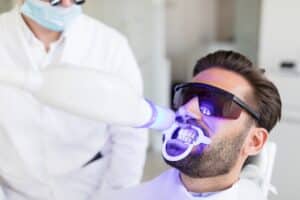Flavored water has gained popularity as a refreshing alternative to plain water, often marketed as a healthier choice than sugary sodas or fruit juices. However, concerns about its impact on dental health have arisen. This blog explores how flavored water affects your teeth and whether dental professionals recommend it.
The Composition of Flavored Water
Flavored water typically contains water, natural or artificial flavors and sometimes added sweeteners. These ingredients can vary by brand and product, but common components include:
- Flavors: Natural fruit extracts or artificial flavorings to give the water a pleasant taste.
- Sweeteners: Some flavored waters contain added sugars or sugar substitutes, which can impact dental health.
- Acids: Many flavored waters have citric acid or other acidic additives to enhance flavor.
The Acidic Nature of Flavored Water
One of the primary concerns about flavored water is its acidity. Acidic beverages can erode tooth enamel, the protective outer layer of your teeth. This enamel erosion can lead to increased sensitivity and a higher risk of cavities.
- Enamel Erosion: Acidic drinks lower the pH level in your mouth, making it more acidic. Prolonged exposure to acid can weaken enamel, making your teeth more susceptible to decay and damage.
- Dental Sensitivity: Erosion of enamel can expose the underlying dentin, leading to increased tooth sensitivity and discomfort.
Sugar Content in Flavored Water
While many flavored waters are marketed as sugar-free, some do contain added sugars or sugar substitutes. Sugars can contribute to plaque formation, which can lead to cavities and gum disease.
- Plaque Formation: Sugar interacts with bacteria in your mouth to form acid, which contributes to plaque buildup. Plaque can lead to tooth decay and gum disease if not regularly removed through proper oral hygiene.
- Sugar Substitutes: Even sugar substitutes, while not contributing to plaque formation directly, can still impact overall oral health and may contribute to other issues like dry mouth.
Do Dental Professionals Avoid Flavored Water?
Many dental professionals, including Dr. Peter, a Haltom City professional dentist, recommend moderation when it comes to flavored water. Here’s why:
- Moderation is Key: While flavored water can be a better alternative to sugary sodas and fruit juices, it should still be consumed in moderation. Frequent consumption of flavored water can increase the risk of enamel erosion and dental issues.
- Acid Neutralization: To mitigate the potential harm, dental professionals suggest drinking flavored water with meals or following it with plain water to help neutralize acids and wash away residues.
- Oral Hygiene: Maintaining good oral hygiene is crucial. Brushing teeth twice daily with fluoride toothpaste and flossing regularly can help counteract the effects of acidic and sugary drinks.
Tips for Protecting Your Teeth
If you enjoy flavored water, consider these tips to minimize potential damage:
- Drink in Moderation: Limit the consumption of flavored water and avoid sipping it throughout the day. Instead, drink it with meals to reduce its impact on your teeth.
- Rinse Your Mouth: After drinking flavored water, rinse your mouth with plain water to help neutralize acids and wash away any residues.
- Use a Straw: Drinking flavored water through a straw can help minimize contact with your teeth, reducing the risk of enamel erosion.
- Maintain Oral Hygiene: Brush your teeth at least twice a day with fluoride toothpaste and floss daily to keep your teeth healthy and clean.
- Regular Dental Checkups: Visit your dentist regularly for professional cleanings and checkups. Your dentist can monitor your oral health and provide personalized advice.
Alternatives to Flavored Water
If you’re concerned about the impact of flavored water on your teeth, consider these alternatives:
- Infused Water: Make your own flavored water at home by infusing plain water with fresh fruits, vegetables, or herbs. This provides flavor without added sugars or acids.
- Herbal Teas: Unsweetened herbal teas can be a flavorful and tooth-friendly alternative.
- Plain Water: Plain water is always the best choice for hydration. Plain water is free from sugars and acids and is the safest option for your teeth.
Flavored water can be a refreshing alternative to sugary beverages, but it does have potential drawbacks for dental health, primarily due to its acidity and, in some cases, added sugars. Dr. Peter, a Haltom City dentist, advises moderation and proper oral hygiene practices to mitigate any adverse effects. By following these guidelines and maintaining regular dental checkups, you can enjoy flavored water while keeping your teeth healthy and strong. For personalized advice and to ensure your oral health is on track, consult with your local dentist.





